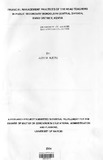| dc.description.abstract | The purpose of this study was to research on financial management practice of
headteachers in public secondary schools in central division, Embu district. Specifically
the study sought to identify how the management of school finance is practiced in the
target schools. Also, it was necessary to determine any weaknesses III management
associated with financial practices in the schools. The literature review explored on the empirical findings on financial management III
schools and what different authors have written on financial management in schools. Thus
literature review dealt with both the financing and investment decisions.
The study employed descriptive research (ex. post. facto) incorporating a survey design. A
population of 25 headteachers, which represented all headteachers in the division, was
targeted. A total population study was therefore used because of the small population size.
Data was collected from the headteachers using semi-structured questionnaires. The
instruments were first piloted and then administered. The resultant data was analyzed
using descriptive statistical methods. The findings of the study indicated the following;
i) In cash management:
a) There was preparation of cash budgets though the span reported of one year
is too long to allow for effective management of cash.
b) The major source of cash was fees.
c) Cash collections were banked daily.
ii) In receivables management, there were a variety of procedures employed to remind
students of overdue debts. The most popular was sending letters to the parents.
iii) The school head was responsible for the management of working capital.
The study indicated that the following practices did not support current theory of working
capital management: Cash Management:
a) The majority of the schools did not have a policy on the amount of cash to hold.
v
b) While theory contends that the major use of funds in schools is staff salaries. The
study indicated that for boarding schools, the largest item of outflow was boarding
expenses. For day schools, the largest item of cash outflows was books and
stationery.
c) A majority of the schools did not invest their idles funds.
Receivable Management:
The schools did not evaluate the creditworthiness of students which practice could be
explained as being strongly influenced by political and social considerations. Inventory Management:
a) A majority of the schools did not have an inventory policy.
b) No school used any sophisticated inventory model.
Credit Management:
a) A large number of the schools did not take short term loans.
b) The majority of the schools did not take advantage of cash discounts.
As a major conclusion of the study therefore, there seems to be lack of professionalism in
some areas of management of school finances. Majority of headteacher lack sufficient
financial management skills. It was also established that headteachers playa key role in
managing school finances in collaboration with the BOG.
Key recommendations were made;
• The study suggests that the headteachers need to embrace a systematic approach to
financial management.
• A more collaborative approach, involving major stakeholders in the schools should be
encouraged to enhance efficiency in collection and disbursement of funds.
• Use of planning, programming and budgeting system (PPBS) should be encouraged
since it is useful in enhancing efficiency and effectiveness in financial management in
schools. Proper personnel should be entrusted with the responsibilities of managing working
capital, they must be trained on financial management practices to enhance their
financial skills. This calls for in-service training to reinforce and update their skills.
• The Ministry of Education to encourage and facilitate for the training of the
headteachers.
The following areas were suggested for further research;
• A study to be done to determine the attitudes (views) of both the school Heads and the
Board of Govemors of the schools on the management of working capital components ...
• Similar study to be done in other divisions, districts and provinces. A study to be
conducted to compare the practices among or between different type of schools (this
would call for hypothesis testing).
• An evaluation study to be done to determine whether there is any relationship between
background training of a school head or other members of the school board and the
existing capital management practices. | en |

